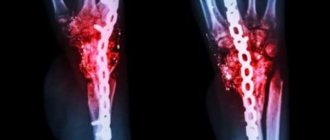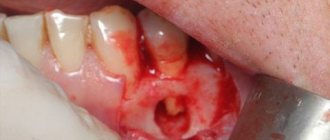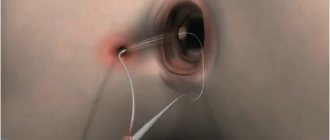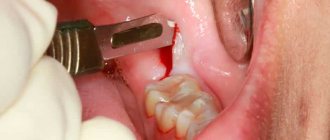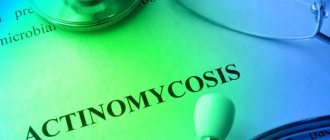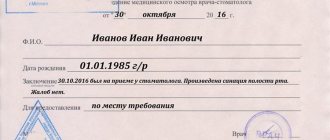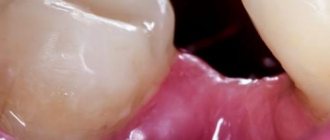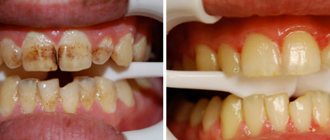Glossalgia - what causes burning and pain in the tongue for no apparent reason
Glossalgia is spoken of in cases where a person experiences unpleasant and even painful sensations in the tongue for no apparent reason. Typically, the pathology manifests itself in the form of burning and tingling of the organ, accompanied by drying out of the mucous membrane. You need to understand that this is only a symptom of certain disorders in the functioning of the internal systems of the body. Most often, this problem becomes a consequence of disruptions in the endocrine system, gastrointestinal diseases, trauma to oral tissues and nervous exhaustion. Treatment involves eliminating the main provoking factor and stopping the primary disease. Further in the article we will understand what this problem is and how to treat it.
Causes and symptoms
Glossalgia is a functional disorder, and the organic causes of its occurrence have not been established, the etiology has not been fully studied. Many experts consider it a polyetiological pathology (caused by several reasons at once).
The first clinical manifestations of glossalgia often occur against the background of trauma to the oral mucosa. Blood circulation is impaired, and blood stagnates in the mucosal tissues.
Traumatic factors can include:
- foreign objects;
- sharp teeth;
- incorrectly installed seals;
- removal of a tooth.
Symptoms of glossalgia can occur due to somatic factors:
- gastrointestinal diseases (ulcers, gastritis, cholecystitis, colitis);
- vascular disorders (hypertension, atherosclerosis);
- liver diseases;
- diseases of the endocrine system (diabetes);
- metabolic disorders of the cervical spine;
- diseases of the central nervous system.
About 2/3 of patients diagnosed with glossalgia have reduced gastric secretion and chronic colitis. Cholecystitis and hepatitis were found in 1/10 of the patients.
Learn about the symptoms and treatment of jaw dislocation and see the classification of the disease.
What can you do at home if your wisdom tooth hurts? Read the answer in this article.
The probable cause of glossalgia can be considered pathologies of the hypothalamus (hereditary and acquired). They increase the risk of disruption of the autonomic nervous system, which in turn leads to malfunctions of the gastrointestinal tract, cardiovascular system, glands and glossalgia.
Risk factors for the development of glossalgia are:
- depression;
- stress;
- chronic fatigue;
- taking certain medications (for example, Etazol).
Most often, glossalgia worries women during menopause, when changes occur in the thyroid gland and vasomotor system. During this period, the sensory excitability of the trigeminal nerve decreases.
Note! Painful sensations in the tongue occur not only with glossalgia. This could be stomatitis, inflammation of the tongue mucosa. Each disease has its own nature and causes of development and a different treatment regimen.
Glossalgia - what is it?
Glossalgia is pain in the tongue area without any visible changes. It manifests itself as a feeling of burning, tingling, rawness, tingling in the tongue, a feeling of dryness in the mouth, not associated with food intake and other irritants. Glossalgia is always secondary to the underlying disease (neurosis, gastrointestinal diseases, liver diseases, endocrine disorders) or injury (dentition placement, tooth extraction, oral surgery, etc.). Eliminating the cause of glossalgia leads to its disappearance.
We are talking about a pathological condition that often develops without any particular reason. The patient experiences pain and burning sensation in the tongue, which is not accompanied by any visible changes in the structure of the organ and the surrounding mucosa. A person may feel tingling and numbness - one-sided or on both sides at once. Sometimes similar signs of glossalgia are observed in the area of the palate and lips. In rare cases, pain will appear throughout the entire oral mucosa. Typically, women over 40 face this problem, but in men this pathology is diagnosed almost 6 times less often1.
What causes burning and pain in the tongue?
Clinical picture of glossalgia
Most often, the patient complains of pain in the tongue, tingling, burning. All these symptoms may occur from time to time or be continuous. They can be expressed in different ways - both weakly and very painfully. The tingling and burning sensation is felt more intensely on the sides of the tongue, less so on the root and back of the organ. The pain is diffuse and has no clear focus or localization. The location of the pain may change periodically. The progression of the disease leads to an expansion of the area of discomfort. They can cover the entire mucous membrane of the mouth, esophagus, and face.
30% of patients with glossalgia experience dry mouth. Moreover, this often intensifies with strong psycho-emotional stress. In some cases, signs of pathology appear only in certain situations (for example, anxiety before speaking in public). During a long conversation, heaviness in the tongue may bother you.
During eating, the manifestations of glossalgia subside and are not expressed so intensely, which in 2/3 of cases becomes the cause of nutritional obesity or bulimia. If the disease is not treated, symptoms will periodically recur. In some cases, the disease may regress on its own.
The mucous membrane of the tongue does not change externally during glossalgia. Only in some cases may there be slight swelling, plaque resulting from dry mouth, hypertrophy of single lingual papillae. Upon examination, a decrease in pain sensitivity in the diseased area and changes in the salivary glands may be revealed.
Patients with glossalgia often show signs of psychological and mental disorders:
- depression;
- excitability;
- increased anxiety;
- suspiciousness;
- sleep disturbance;
- rarely – manifestations of autism.
Patients show special attention to detail and delve deeper into their condition. Attempts to calm a person can cause him to become aggressive. Fear of other diseases appears. The patient may develop a fear of treatment procedures, which is often the reason for refusing therapy.
Why pathology may develop
In medicine, this phenomenon is considered as a secondary symptom of a functional disorder. Most often, the cause of the problem lies in mechanical injury to the tongue. Among other possible provoking factors, experts identify the following phenomena and conditions:
- malfunctions of the nervous system, frequent neuroses and stress are one of the most common prerequisites for the pathological manifestation in question,
- problems in the gastrointestinal tract,
- disturbances in the functioning of the endocrine system,
- liver and kidney diseases,
- heart and vascular diseases,
- disruptions in the functioning of the hematopoietic organs,
- encephalitis, neurosyphilis.
Disturbances in the functioning of the gastrointestinal tract can lead to pathology.
If the whole point is injury to an organ, then the problem may lie in incorrectly installed fillings, crowns or prostheses, or poor-quality materials from which these orthopedic systems are made. The cause of the development of glossalgia can be traumatic extraction of one or several teeth at once, recent surgery, chips and cracks in the enamel.
“I personally had to live with these symptoms for several years. I went around to many doctors - everyone shrugged. As a result, a friend recommended a good clinic and dentist. There I underwent a full examination, the doctor sent me to a neurologist, and he prescribed me a course of medications, which finally began to help! Every day the symptoms are getting weaker, and you can’t imagine what a relief this is!”
Katyusha47, Moscow, from correspondence on the forum
It should be noted that suspicious people who experience severe anxiety and worry about almost any reason are more prone to glossalgia than others. If a symptom appears, you should immediately contact a specialist.
Characteristic symptoms
To better imagine the clinical picture, it is worth identifying the accompanying symptoms, which often manifest themselves against a background of burning and itching in the tongue. Here are the main signs of the problem:
- sharp burning sensation as if from red pepper or mustard,
- subsidence of acute manifestations at the time of eating,
- dry mucous membranes, constant thirst,
- exacerbation of symptoms during stress, severe anxiety and emotional discomfort,
- lack of clear localization of pathological manifestations, although in the vast majority of cases the tip and sides of the organ are affected,
- slight swelling of the tongue,
- enlargement and redness of taste buds,
- increased excitability, irritability, stress and depression.
Acute burning sensation, dryness and other symptoms can characterize the pathology.
When the cause of the problem is disturbances in the functioning of the nervous system or neurosis, other characteristic symptoms arise. Among these, the most common are sleep disturbances and disruptions in the functioning of the cardiovascular system.
Features of diagnostics
When answering the question of whether glossalgia can be cured, it is necessary to immediately clarify that in order to eliminate the symptom, it is necessary to identify its true cause and work directly with it. In other words, you need an accurate diagnosis, which the doctor will use as a basis when choosing a course of treatment. Differentiated diagnostics is aimed at identifying neurological pathologies. In some conditions, similar symptoms are observed, however, along with manifestations of glossalgia, numbness of the organ and loss of tactile sensations may also be noted.
On a note! Glossalgia is often confused with cervical osteochondrosis due to the similarity of clinical manifestations. An important criterion when making a diagnosis is the frequency and frequency of unpleasant sensations. In our case, the discomfort is constant, and its severity noticeably weakens during meals.
As part of the diagnostic examination, the specialist must find out whether there are any mechanical factors leading to injury to the tongue and the development of characteristic symptoms. This could be incorrectly installed orthopedic structures, chips and cracks in the teeth, or an incorrect bite. If the problem is systematic damage to the soft tissues of the organ, then first of all it will be necessary to remove the provoking factor and only then carry out symptomatic treatment.
Some orthopedic devices can cause tongue injury
Diagnosis of glossalgia
Differential diagnosis of glossalgia (glossodynia) with other pathologies.
Since glossalgia (glossodynia) is a functional disorder, it is differentiated primarily from general organic disorders:
Osteochondrosis of the cervical spine
In this situation, additional research and consultation with related specialists are necessary, since in this case glossalgia does not develop due to pathology in the maxillofacial area. And most often it completely disappears after treatment of the underlying pathology. The same applies to all other general somatic pathologies that are associated with manifestations of glossalgia (glossodynia).
Any glossitis (inflammation of the tongue)
Glossitis, as well as glossalgia (glossodynia), is characterized by the appearance of pain in the tongue, but in the case of glossitis, the mucous membrane of the tongue undergoes certain changes that are characteristic of each glossitis. The pain syndrome with glossitis intensifies during meals, but with glossalgia (glossodynia) it does not.
Oral injuries
Any traumatic injury to the tongue usually results in a sharp pain syndrome limited to the area of injury, which is easily detected on the surface of the mucous membrane of the tongue.
Various pain symptoms
It is also necessary to distinguish the symptoms of glossalgia (glossodynia) from organic damage to the main and peripheral nerves (neuritis, neuralgia). In this case, in the diagnosis of glossalgia (glossodynia), pain syndrome, its nature and prevalence play an important role. With glossalgia, the pain is distributed throughout the entire tongue and has no clear localization, and with neuralgia or neuritis, the doctor can always determine the specific trigger zone of the unpleasant sensation (by palpating the areas where the nerve endings are closest to the integumentary tissues).
In addition, with neuritis and neuralgia, the pain occurs strictly in the area innervated by the affected nerve trunk, and it intensifies when eating.
When verifying glossalgia (glossodynia), pain syndrome (with a visually unchanged tongue) is often the decisive factor.
How is glossalgia treated today?
As mentioned above, the choice of a specific treatment method will directly depend on the root cause of the problem. If the cause is a malocclusion, you need to see an orthodontist. If there are problems with fillings, crowns and prosthetic devices, you will have to undergo repeated treatment. If there are disturbances in the functioning of the internal systems of the body, you may need the help of a cardiologist, endocrinologist, neurologist, or psychotherapist. Glossalgia can be treated, but the successful outcome of events largely depends on the patient himself, on how responsibly he approaches treatment. And now more about what methods are used in the treatment of this pathology.
Conservative therapeutic methods
To begin with, the doctor will suggest undergoing a complete sanitation of the oral cavity: removing plaque and tartar, healing all carious cavities and eliminating foci of inflammation, if any. As part of the therapy, sedatives, iron, bromine, sleeping pills and even mild tranquilizers can be prescribed - all these medications are aimed at restoring the patient’s emotional state and strengthening his nervous system. This treatment vector is relevant in cases where the cause of the problem is neurosis or severe stress.
As for physiotherapy, such approaches are used as symptomatic treatment. Patients with glossalgia may be prescribed the following procedures:
- relaxing massage,
- electrophoresis,
- phototherapy,
- use of galvanic collar,
- the use of decoctions and infusions of medicinal herbs,
- rinsing the mouth with special pharmaceutical products.
Phototherapy procedure
The measures described above help to quickly relieve swelling and inflammation, stimulate metabolic processes in the mucous membrane, and restore the nervous system. If there are neurotic preconditions, a course of psychotherapy will be required.
Traditional medicine tips
Traditional medicine will help alleviate the condition during treatment. So, here are the most effective “grandmother’s” tips:
- take a few pinches of dried sage and celandine, mix and pour a glass of boiling water. After half an hour, the product needs to be filtered. After this, it can be used to treat the surface of the organ. Just blot a piece of gauze and gently wipe the affected area. At night, the mucous membrane can be treated with tea tree oil,
- Pour boiling water over a tablespoon of oak bark and boil in a water bath for half an hour. Next, the product needs to be cooled, strained and slightly diluted with water at room temperature. At the end you should add a small spoon of honey. It is recommended to rinse your mouth with the resulting solution several times a day,
Gargling with a decoction of oak bark will help in treatment - You can also take a pinch of chamomile, mint and St. John's wort, pour boiling water over it and let it brew for a while. After half an hour, you can strain the product and start using it for rinsing.
Many medicinal herbs have a pronounced calming and anti-inflammatory effect. However, before using any traditional medicine recipes, you should consult your doctor.
Methods of treating the disease
Without treatment, glossalgia can develop for years. It is characterized by periodic outbreaks and attenuation of symptoms. Since the disease is multi-etiological in nature, there is no single treatment method. You may need the help of different specialists: a therapist, a dentist, a psychiatrist, an endocrinologist.
Medications
First, the patient should see a dentist. He will sanitize your mouth. If necessary, correct defects of teeth and bite. It is necessary to eliminate factors that have a traumatic effect on the surface of the tongue.
To relieve pain, anesthetics are used:
- Movalis;
- Donalgin;
- Decaine;
- Citral;
- Trimecaine;
- Mesulide.
Local applications and baths with a solution of lidocaine or novocaine, anesthesin in peach oil are used for pain.
If it is determined that the cause of glossalgia is a general disease, the help of a specialist is needed who will prescribe appropriate therapy.
To normalize the tone of the autonomic nervous system, the following appointments are prescribed for 1.5-2 months:
- Phenibut;
- Bromine;
- Pyroxane;
- Amitriptyline;
- Motherwort.
To normalize local blood circulation in the tissues of the oral cavity, the following are indicated:
- Trental;
- Cinnariein;
- A nicotinic acid;
- Euffilin;
- Cavinton.
To normalize the patient's psycho-emotional state, weak tranquilizers (for example, Adaptol) are indicated. Additionally, a 10-day course of vitamin therapy (injections of B vitamins, intake of ascorbic acid) is prescribed.
To reduce the viscosity of saliva, use Bromhexine, an infusion of Thermopsil. You can rinse your mouth with water-soluble flax seed extract. You can relieve dry mouth by rinsing with a 1% solution of pilocarpine hydrochloride.
Why is open curettage of periodontal pockets performed in dentistry? We have the answer!
How to quickly cure gum gum gum disease at home? Effective methods are described on this page.
Read patient reviews about basal dental implantation at this address.
Numbness of the tongue is treated with iron-containing drugs:
- Ferrocal;
- Gemostimulin.
Physiotherapy
To consolidate the results of drug treatment, manual and physical therapy are indicated:
- electrophoresis using a mixture of bromine and novocaine;
- massage of the collar area;
- acupuncture;
- laser therapy;
- galvanotherapy;
- iontophoresis;
- hypnosis.
The average duration of treatment is about 2 months. The prognosis for recovery is generally favorable.
Folk remedies and recipes
In addition to basic therapeutic methods of treatment, traditional ones can be used. Mostly herbal decoctions and oils are used.
- To eliminate dry mouth due to glossalgia, it is recommended to treat it with rosehip oil.
- Rinse your mouth 4-5 times a day with a decoction of oak or sage bark, adding honey (1 spoon per glass of decoction).
- Half an hour before meals, drink ½ glass of juice from a mixture of fruits and vegetables, adding 1 teaspoon of nut or olive oil and fish oil.
- Mix chamomile, St. John's wort and mint in equal proportions. Pour 1 spoon of the mixture into 200 ml of boiling water. Leave for 1 hour and rinse your mouth several times a day.
Glossalgia is a disease that does not have a single origin. Therefore, there is no established method of treating it. The main thing is to make the diagnosis correctly so that subsequent therapy gives a positive result and there is no relapse of the disease.
Video about the causes of glossalgia:
Prevention rules
To avoid relapses and, in general, to reduce the risk of developing such a problem, experts advise following simple rules of prevention. Here are the main recommendations in this regard:
- try to limit the consumption of salty and spicy foods, sour juices and smoked foods, strong alcohol,
- If carious cavities are detected, you should immediately begin to treat and fill them,
- before going to the dentist, it would be a good idea to find out the level of his competence, and also make sure that the clinic uses only high-quality materials,
- you need to organize proper oral care, systematically brush your teeth and prevent injury to the mucous membrane,
- if there are incorrectly installed fillings, crowns and prosthetic structures, as well as anomalies in the structure of the dentofacial apparatus, you need to start correcting the situation as early as possible,
- From time to time, it is allowed to take a course of rinsing with decoctions of medicinal herbs, for example, sage or chamomile, but first it is better to discuss this point with your dentist.
Only a specialist can prescribe the correct treatment.
Remember to rinse your mouth and use dental floss after every snack and full meal. Regular preventative visits to a specialist, as well as professional cleaning of plaque and tartar at least once every six months, will help you avoid most dental problems.
- According to WHO.
